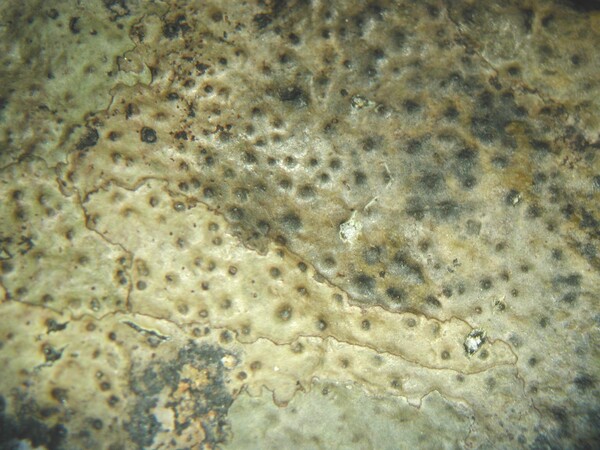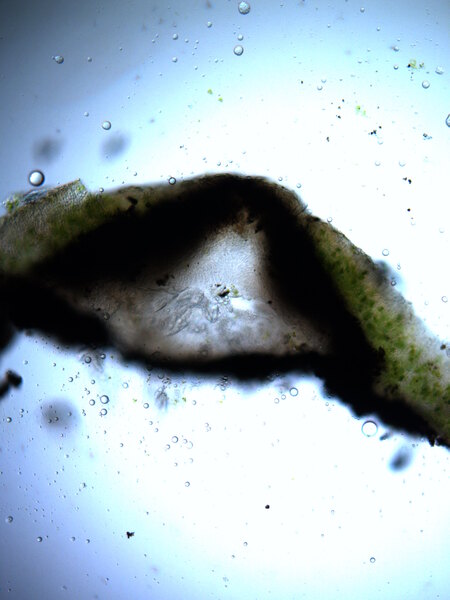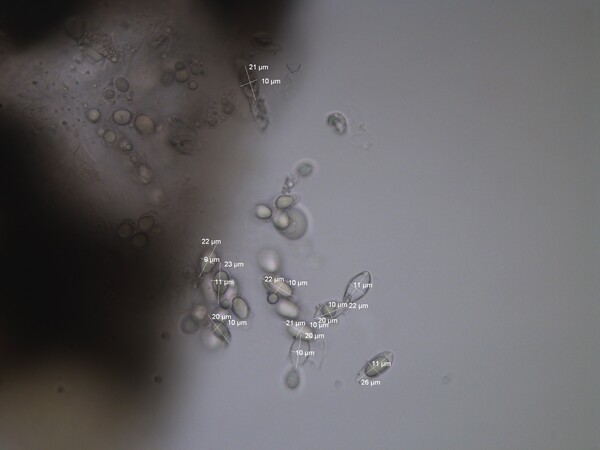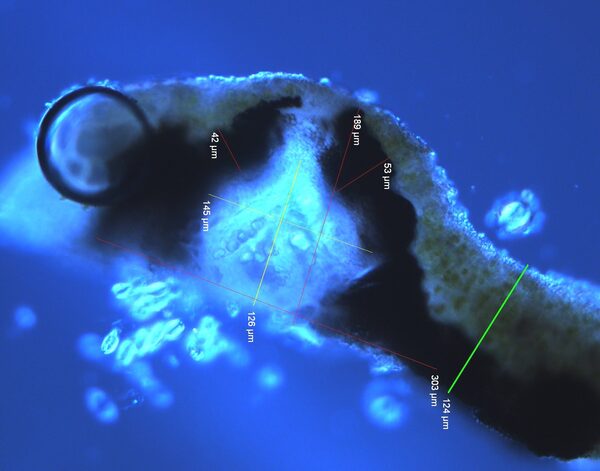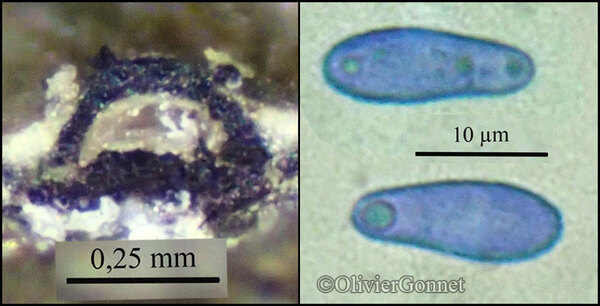Verrucaria funckii (Spreng.) Zahlbr.
Cat. Lich. Univ., 1: 41, 1921. Basionym: Pyrenula funckii Spreng. - Crypt. Gew., 32: 5, 1826.
Synonyms: Verrucaria elaeomelaena f. silicicola Zschacke; Verrucaria silicea Servít
Description: Thallus crustose, episubstratic, smooth, continuous or with a few cracks, subgelatinous when wet, pale grey-green to brown (often turning orange-brown in the herbarium) when dry, greenish and often transparent when wet, 50-250 μm thick, delimited by a thin whitish prothallus from the rock, or by dark lines from conspecific thalli. Cortex poorly developed, 10-15 μm thick, with a yellowish brown pigment in sun-forms, colourless in shade-forms; algal layer 70-120 μm thick; medulla paraplectenchymatous, the cells arranged in columns, with a well-visible and usually continuous black basal layer formed by neighbouring involucrella. Perithecia almost completely covered by a thalline layer, not projecting or forming shallowly conical, 0.3-0.6 mm wide projections. Involucrellum 15-20 μm thick, red-brown and K+ grey, distinctly conical, reaching to base-level and often diverging from exciple in lower part. the space between involucrellum and exciple occupied by pigmented cells; exciple 0.18-0.4 mm across, the wall colourless except around the ostiole; hamathecium of 17-25 μm long periphyses and periphysoids, interascal filaments absent; hymenial gel hemiamyloid, I+ red (I+ blue at very low concentrations of I), K/I+ blue. Asci 8-spored, clavate, I-, fissitunicate, the wall thickened above, with an ocular chamber, dehiscent by extrusion of an endotunica to form a delicate rostrum, Verrucaria-type. Ascospores 1-celled, hyaline, ellipsoid to narrowly ellipsoid, (17-)22-26(-28.5) x (7-)8-11(-13) μm, at least some of them surrounded by a 0.5(-2) μm thick, gelatinous perispore. Photobiont chlorococcoid, the cells arranged in vertical columns. Spot tests: K-, C-, KC-, P-, UV-. Chemistry: without lichen substances.
Growth form: Crustose
Substrata: rocks
Photobiont: green algae other than Trentepohlia
Reproductive strategy: mainly sexual
Periodically submerged (e.g. in creeks)
Commonnes-rarity: (info)
Alpine belt: very rare
Subalpine belt: rare
Montane belt: very rare
Dry submediterranean belt: absent
Humid submediterranean belt: absent
Padanian area: absent
pH of the substrata:
1 2 3 4 5
Solar irradiation:
1 2 3 4 5
Aridity:
1 2 3 4 5
Eutrophication:
1 2 3 4 5
Poleotolerance:
0 1 2 3
Altitudinal distribution:
1 2 3 4 5 6
Rarity
absent
extremely rare
very rare
rare
rather rare
rather common
common
very common
extremely common
Loading data...
Occurrence data
Predictive map
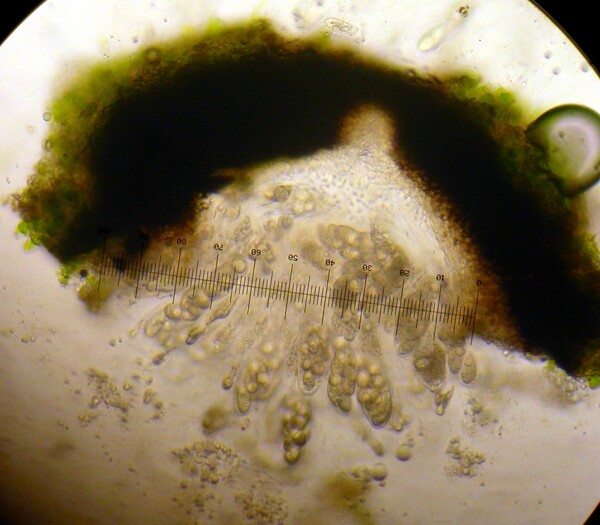
Juri Nascimbene - CC BY-SA 4.0; Owner: ITALIC - Dyades Project - Dept. of Life Sciences, University of Trieste
Italy, Sardinia
2014
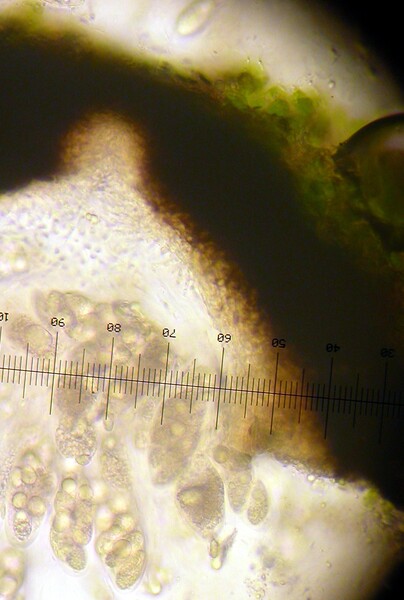
Juri Nascimbene - CC BY-SA 4.0; Owner: ITALIC - Dyades Project - Dept. of Life Sciences, University of Trieste
Italy, Sardinia
2014
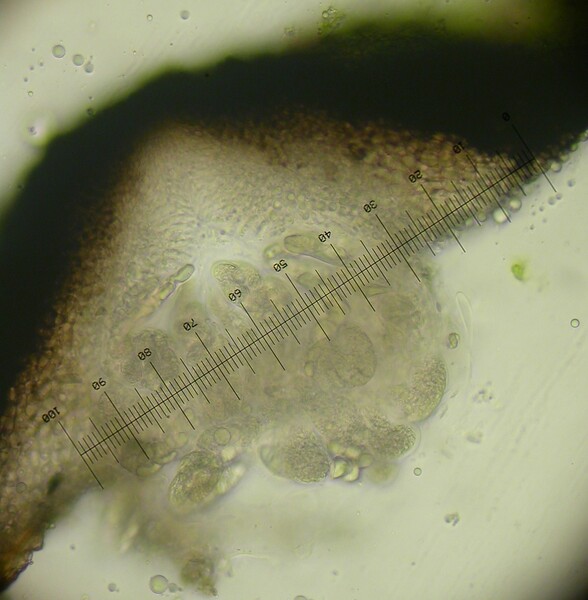
Juri Nascimbene - CC BY-SA 4.0; Owner: ITALIC - Dyades Project - Dept. of Life Sciences, University of Trieste
Italy, Sardinia
2014
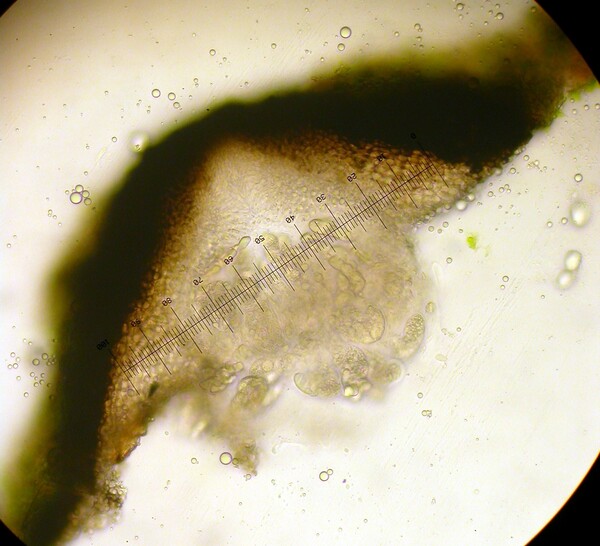
Juri Nascimbene - CC BY-SA 4.0; Owner: ITALIC - Dyades Project - Dept. of Life Sciences, University of Trieste
Italy, Sardinia
2014
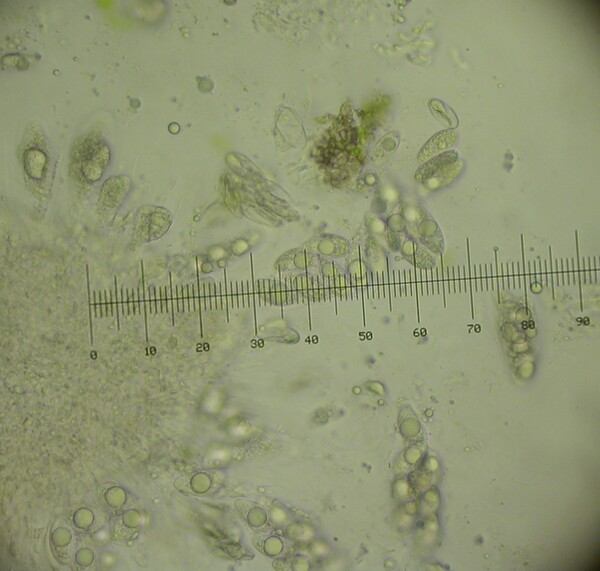
Juri Nascimbene - CC BY-SA 4.0; Owner: ITALIC - Dyades Project - Dept. of Life Sciences, University of Trieste
Italy, Sardinia
2014
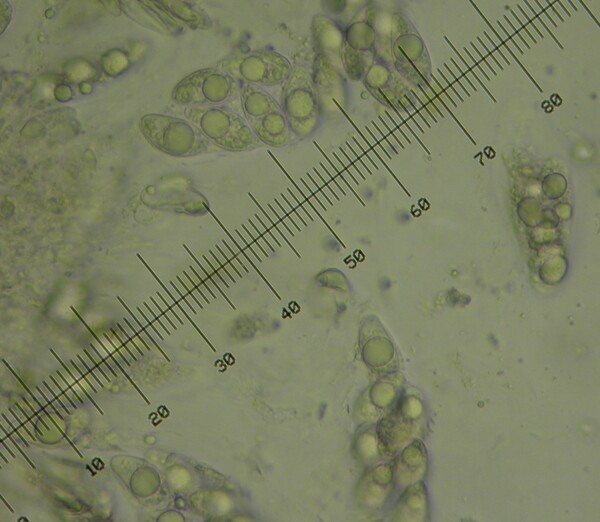
Juri Nascimbene - CC BY-SA 4.0; Owner: ITALIC - Dyades Project - Dept. of Life Sciences, University of Trieste
Italy, Sardinia
2014
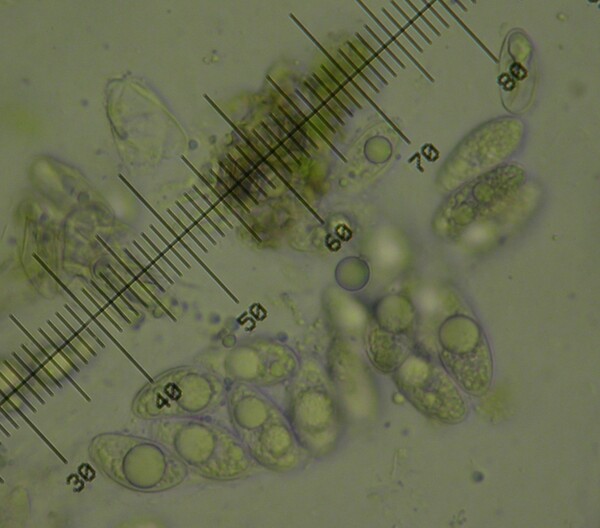
Juri Nascimbene - CC BY-SA 4.0; Owner: ITALIC - Dyades Project - Dept. of Life Sciences, University of Trieste
Italy, Sardinia
2014
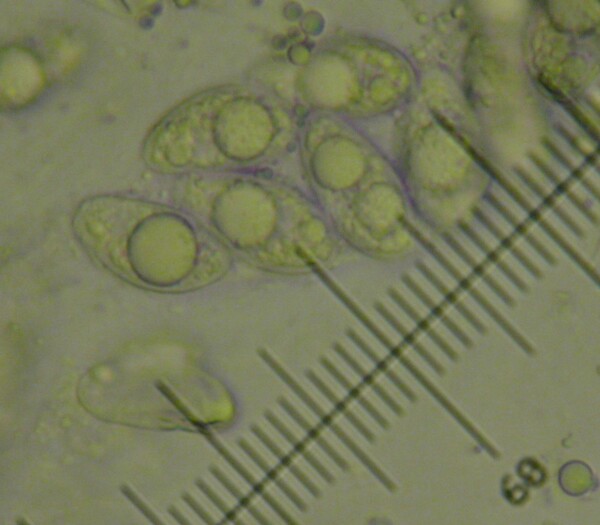
Juri Nascimbene - CC BY-SA 4.0; Owner: ITALIC - Dyades Project - Dept. of Life Sciences, University of Trieste
Italy, Sardinia
2014
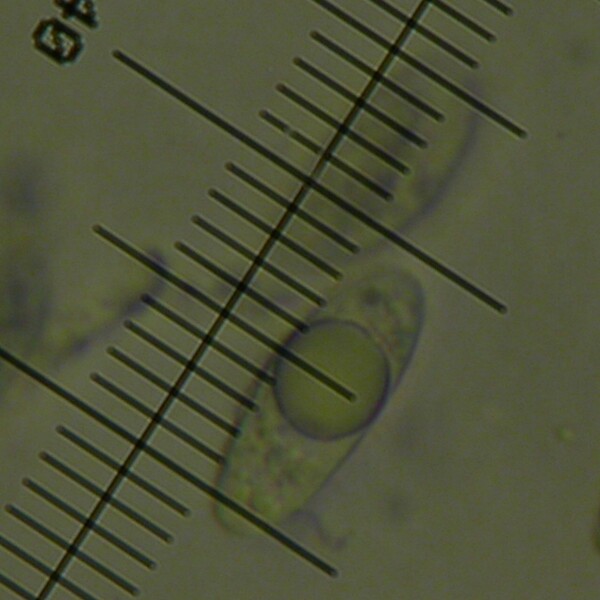
Juri Nascimbene - CC BY-SA 4.0; Owner: ITALIC - Dyades Project - Dept. of Life Sciences, University of Trieste
Italy, Sardinia
2014
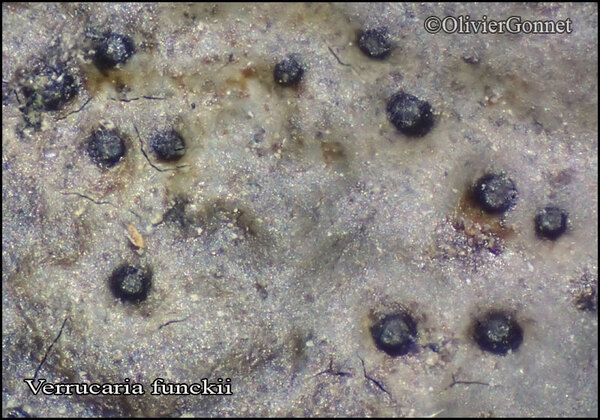
Courtesy Danièle et Olivier Gonnet - Source: https://www.afl-lichenologie.fr/Photos_AFL/Photos_AFL_V/Texte_V/Verrucaria_funckii.htm
France, 4/10/2011 - Asco - sous le lac d’Argent, 2100 m - Corse
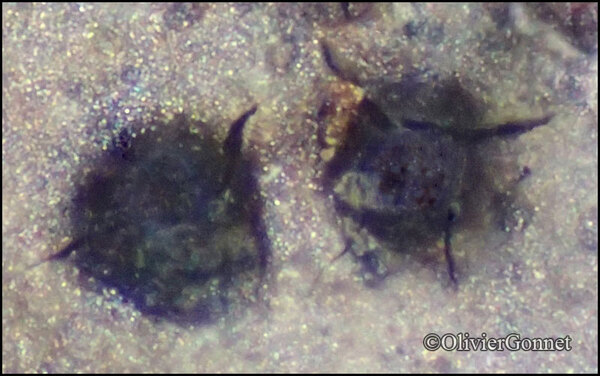
Courtesy Danièle et Olivier Gonnet - Source: https://www.afl-lichenologie.fr/Photos_AFL/Photos_AFL_V/Texte_V/Verrucaria_funckii.htm
France, 4/10/2011 - Asco - sous le lac d’Argent, 2100 m - Corse
Growth form: Crustose
Substrata: rocks
Photobiont: green algae other than Trentepohlia
Reproductive strategy: mainly sexual
Periodically submerged (e.g. in creeks)
Commonnes-rarity: (info)
Alpine belt: very rare
Subalpine belt: rare
Montane belt: very rare
Dry submediterranean belt: absent
Humid submediterranean belt: absent
Padanian area: absent
pH of the substrata:
| 1 | 2 | 3 | 4 | 5 |
Solar irradiation:
| 1 | 2 | 3 | 4 | 5 |
Aridity:
| 1 | 2 | 3 | 4 | 5 |
Eutrophication:
| 1 | 2 | 3 | 4 | 5 |
Poleotolerance:
| 0 | 1 | 2 | 3 |
Altitudinal distribution:
| 1 | 2 | 3 | 4 | 5 | 6 |
Rarity
absent
extremely rare
very rare
rare
rather rare
rather common
common
very common
extremely common
Loading data...
Occurrence data
Predictive map

Juri Nascimbene - CC BY-SA 4.0; Owner: ITALIC - Dyades Project - Dept. of Life Sciences, University of Trieste
Italy, Sardinia
2014

Juri Nascimbene - CC BY-SA 4.0; Owner: ITALIC - Dyades Project - Dept. of Life Sciences, University of Trieste
Italy, Sardinia
2014

Juri Nascimbene - CC BY-SA 4.0; Owner: ITALIC - Dyades Project - Dept. of Life Sciences, University of Trieste
Italy, Sardinia
2014

Juri Nascimbene - CC BY-SA 4.0; Owner: ITALIC - Dyades Project - Dept. of Life Sciences, University of Trieste
Italy, Sardinia
2014

Juri Nascimbene - CC BY-SA 4.0; Owner: ITALIC - Dyades Project - Dept. of Life Sciences, University of Trieste
Italy, Sardinia
2014

Juri Nascimbene - CC BY-SA 4.0; Owner: ITALIC - Dyades Project - Dept. of Life Sciences, University of Trieste
Italy, Sardinia
2014

Juri Nascimbene - CC BY-SA 4.0; Owner: ITALIC - Dyades Project - Dept. of Life Sciences, University of Trieste
Italy, Sardinia
2014

Juri Nascimbene - CC BY-SA 4.0; Owner: ITALIC - Dyades Project - Dept. of Life Sciences, University of Trieste
Italy, Sardinia
2014

Juri Nascimbene - CC BY-SA 4.0; Owner: ITALIC - Dyades Project - Dept. of Life Sciences, University of Trieste
Italy, Sardinia
2014

Courtesy Danièle et Olivier Gonnet - Source: https://www.afl-lichenologie.fr/Photos_AFL/Photos_AFL_V/Texte_V/Verrucaria_funckii.htm
France, 4/10/2011 - Asco - sous le lac d’Argent, 2100 m - Corse



